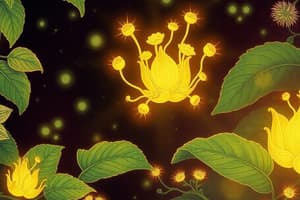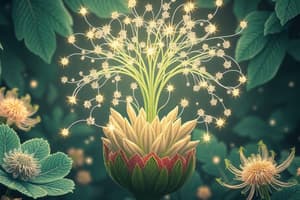Podcast
Questions and Answers
During photosynthesis, what is the primary role of the stomata?
During photosynthesis, what is the primary role of the stomata?
- Distributing manufactured sugars throughout the plant.
- Absorbing water and minerals from the soil.
- Allowing carbon dioxide to enter the plant. (correct)
- Releasing oxygen into the atmosphere.
What is the key function of chlorophyll in the process of photosynthesis?
What is the key function of chlorophyll in the process of photosynthesis?
- Absorbing water from the soil.
- Absorbing light energy. (correct)
- Releasing oxygen into the atmosphere.
- Transporting manufactured sugars.
What best describes the transformation of raw sap into elaborated sap in a plant?
What best describes the transformation of raw sap into elaborated sap in a plant?
- Elaborated sap transforms into raw sap as it releases oxygen into the atmosphere.
- Raw sap is the result of photosynthesis, while elaborated sap is the initial mixture of water and minerals.
- Raw sap, containing manufactured sugars and water, becomes elaborated sap after absorbing minerals from the soil.
- Raw sap is converted into elaborated sap when manufactured sugars are mixed with water and distributed throughout the plant. (correct)
In a laboratory experiment studying photosynthesis using an aquatic plant like Elodea, what would the bubbles forming around the plant typically consist of?
In a laboratory experiment studying photosynthesis using an aquatic plant like Elodea, what would the bubbles forming around the plant typically consist of?
Which of the following is true regarding the inputs and outputs of photosynthesis?
Which of the following is true regarding the inputs and outputs of photosynthesis?
Flashcards
Light Energy
Light Energy
The energy from sunlight that is absorbed by chlorophyll in leaves for photosynthesis.
CO₂ Entry
CO₂ Entry
Carbon dioxide enters the plant through small openings called stomata in the leaves.
Water Absorption
Water Absorption
Water and minerals are absorbed by roots from the soil, forming raw sap.
O₂ Release
O₂ Release
Signup and view all the flashcards
Manufactured Sugars
Manufactured Sugars
Signup and view all the flashcards
Study Notes
Photosynthesis Process
- Photosynthesis uses light energy from the sun to convert carbon dioxide (CO2) and water (H2O) into glucose (sugar) and oxygen (O2).
- Light energy is absorbed by chlorophyll in chloroplasts.
- Carbon dioxide enters the leaves through stomata.
- Water is absorbed by the roots and transported to the leaves.
- Glucose is the plant's food source and also used in respiration.
- Oxygen is released into the atmosphere.
Plant Structure and Function
- Water and minerals are absorbed through roots and transported as "sap" throughout the plant.
- Minerals and water move up the plant from roots to leaves forming "raw sap."
- The glucose produced in photosynthesis is transported as "processed sap."
- Stomata are small openings on leaves that allow gas exchange (intake of CO2 and release of O2.)
- Roots absorb water and minerals to support the plant.
Photosynthesis Experiment (Elodea)
- Materials for the experiment likely include:
- Elodea plant
- Beaker
- Funnel
- Test tube
- Light source
- Graduated cylinder
- Water
- The bubbles produced in the experiment are oxygen.
- The purpose of the experiment is likely to demonstrate photosynthesis in an aquatic plant, while observing the release of oxygen.
Studying That Suits You
Use AI to generate personalized quizzes and flashcards to suit your learning preferences.




